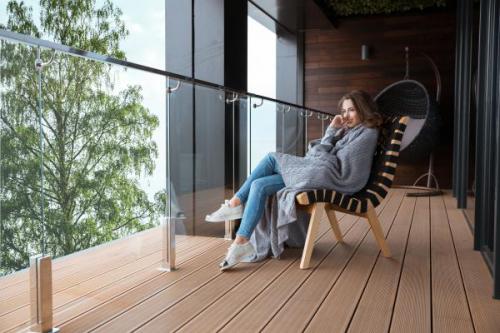









VIDRIO INTELIGENTE

Intelligent glass - the future of our windows
Intelligent Glass
Intelligent glass, also known as switchable or smart glass, refers to glazing that can change its transparency. The energy required for this is conducted to the pane either via electricity or solar radiation.
The areas of application for intelligent glass are expanding, but since the price is currently still relatively high, it is more likely to be found in luxury office towers than in ordinary residential buildings.
Some glasses provide protection from bright light and sun, while others merely provide privacy. Sometimes this promising technology also regulates the temperature.
What is switchable glass?
Switchable glass is also called "intelligent" glass because of its ability to change the light transmission at the touch of a button. This makes it one of the so-called "functional glasses".
One of its greatest advantages is that it can be made milky, transparent, dimming or colored by remote control.
Large companies use dimmable windows via circuitry, for example, to avoid excessive heat or glare in employee offices, or as a constantly changing partition between meeting rooms and other areas. Intelligent glass is an acquisition that is certainly not standard equipment in most homes. In offices, however, a façade incorporating intelligent functional glass can be of great benefit and even save air conditioning and blinds.
flip-top glass
The innovation for more well-being - how smart glasses work
Three different types of intelligent glazing can be distinguished, depending on the technology used to produce these glasses and to influence their transparency:
Electrochromic glass ("switchable glass")
Thermochromic glazing
LC Glass
Thermochromic and electrochromic glass can completely control the incidence or radiation of light and heat. The light transmission can be reduced to 15 to 50 percent, especially in summer.
Liquid Crystal (LC)
Electrochromic glass/ switchable glass
Electrochromic discs can change color when a voltage is applied, thanks to a special thin coating. Although this does not result in effective visual protection, these glazings are still suitable as sun protection, for subdued light or for temperature control in the room.
As soon as the voltage is removed, the switchable film becomes transparent again and light can enter the room unhindered. Electrochromic windows in darkened form usually have a bluish tint, which is due to the coating used. So, when it is very hot, they intensify the effect of a partition wall between inside and outside.
Thermochromic glazing
The coloration of thermochromic windows is influenced by the incident solar radiation or the degree of heat generated by it.
The glazing darkens automatically when the temperature on the glass pane reaches a certain value. This is done by a foil with thermochromic substances.
When the sun hits the pane, the substances in the film change color and create an effective solar control glass. The process can also be controlled by an operator, sometimes even with a smartphone.
Liquid Crystal
Liquid Crystal - or LC - is an intelligent glass that works by means of polymeric liquid. The difference to the other examples in the field of functional glass is that Liquid Crystal panes only become transparent when electricity is applied and do not lose their light transmission the other way round.
UV radiation is not blocked with this technology. However, the crystals scatter the incident light in such a way that a frosted glass look is created. The glasses, which consist of two float glass panes - with the crystal film in the middle - are therefore ideal as privacy screens that can be switched off at the touch of a button.
Saving energy with intelligent glass
If the lighting conditions are rated as optimal, the glass surface usually remains clear, otherwise it can simply be switched to another state: Electrochromic windows on buildings, for example, are bathed in a mostly opaque blue thanks to a chemical-electrical reaction, while LC glass is often used for privacy protection.
In the event of darkening, lower surface temperatures are measured on the pane, saving high costs for air conditioning. Electrically controllable glasses thus prevent unnecessary electricity costs and thus contribute not only to a positive energy balance but also to a pleasant working atmosphere. In addition, the use of smart windows ensures that there are no annoying reflections on the screen.
